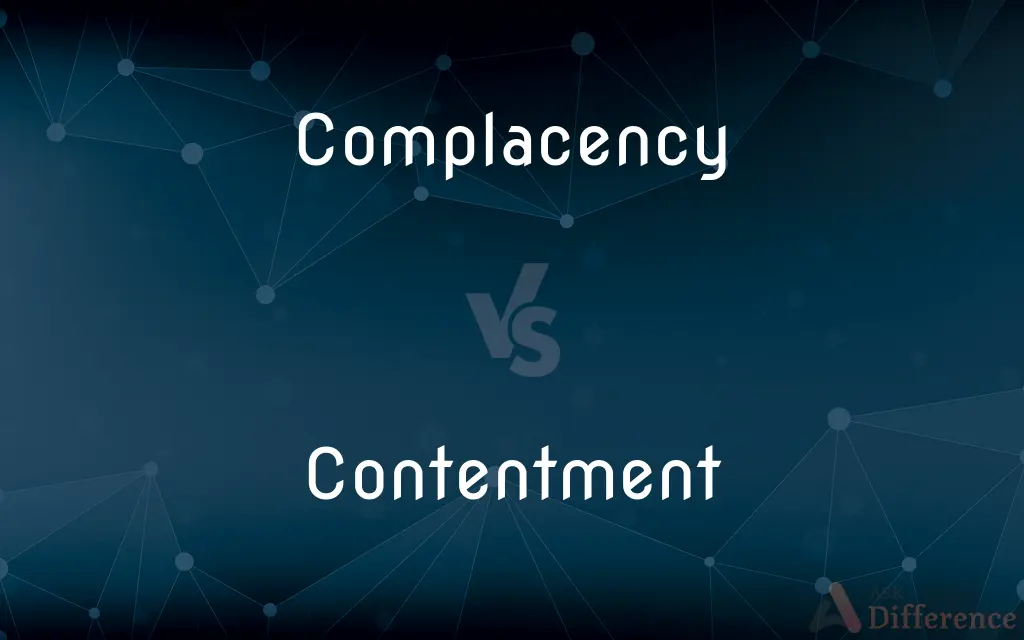Complacency vs. Contentment — What's the Difference?
Edited by Tayyaba Rehman — By Fiza Rafique — Published on October 26, 2023
Complacency is self-satisfaction without awareness of dangers or deficiencies, while contentment is a peaceful satisfaction with one's circumstances.

Difference Between Complacency and Contentment
Table of Contents
ADVERTISEMENT
Key Differences
Complacency and Contentment, while sometimes used interchangeably, harbor distinct nuances in meaning. Complacency is derived from an unwarranted feeling of being pleased with oneself or one's actions, often without awareness of potential dangers or deficiencies. This self-satisfaction could arise from overconfidence or a disregard for the evolving environment around oneself. It carries a connotation of passivity, where one might be resistant to change, even when it's necessary.
Contentment, on the other hand, paints a more positive picture. It embodies a state of peaceful happiness or satisfaction, often derived from being at peace with one's circumstances, regardless of what they might be. Unlike complacency, contentment doesn't denote ignorance of potential issues. Instead, it signifies an inner equilibrium and acceptance of life's highs and lows.
While complacency suggests a lack of motivation to improve or change, contentment can coexist with ambition. One can be content with their current state, yet still aspire for growth or betterment. Complacency might be seen as a pitfall in many professional settings, as it can lead to stagnation.
Comparison Chart
Primary Definition
Self-satisfaction without awareness of dangers or deficiencies.
Peaceful satisfaction with one's circumstances.
Connotation
Negative, suggesting ignorance or passivity.
Positive, indicating inner peace and acceptance.
ADVERTISEMENT
Relation to Change
Resistant to change.
Can coexist with ambition and a desire for change.
Presence of Awareness
Often lacks awareness of potential issues.
Acknowledges reality, accepting highs and lows.
Desired in Settings
Seen as negative in professional settings.
Celebrated in personal/spiritual contexts.
Compare with Definitions
Complacency
A feeling of uncritical satisfaction with oneself.
His complacency about the business's success was its downfall.
Contentment
Acceptance without complaint or desire for more.
Contentment isn't about having everything, but being at peace with what you have.
Complacency
Resistance to change due to self-satisfaction.
The company's complacency in updating technology reduced its market share.
Contentment
Satisfaction derived from one's circumstances.
The serene landscape brought her instant contentment.
Complacency
A passive state with no desire for improvement.
Complacency in his job role prevented his professional growth.
Contentment
A state of peaceful happiness or satisfaction.
She found contentment in simple living.
Complacency
Smugness or self-pleasure without a basis.
The team's complacency cost them the championship.
Contentment
Inner peace with one's situation.
Despite the challenges, he felt a deep contentment.
Complacency
Unwarranted confidence ignoring potential dangers.
Complacency in safety measures led to accidents.
Contentment
A state of mind where one's desires are confined.
Meditation brought her a sense of contentment.
Complacency
A feeling of contentment or self-satisfaction, especially when coupled with an unawareness of danger, trouble, or controversy.
Contentment
The state of being contented; satisfaction.
Complacency
An instance of contented self-satisfaction.
Contentment
A source of satisfaction
The contentments of a comfortable retirement.
Complacency
A feeling of contented self-satisfaction, especially when unaware of upcoming trouble.
Contentment
The state or degree of being contented or satisfied.
Complacency
An instance of self-satisfaction.
Contentment
Happiness in one's situation; satisfaction
Complacency
Passivity as a result of contentment with the current situation.
Contentment
The neurophysiological experience of satisfaction and being at ease in one's situation, body, and/or mind.
Complacency
The feeling you have when you are satisfied with yourself;
His complacency was absolutely disgusting
Contentment
The state of being contented or satisfied; content.
Contentment without external honor is humility.
Godliness with contentment is great gain.
Contentment
The act or process of contenting or satisfying; as, the contentment of avarice is impossible.
Contentment
Gratification; pleasure; satisfaction.
At Paris the prince spent one whole day to give his mind some contentment in viewing of a famous city.
Contentment
Happiness with one's situation in life
Common Curiosities
Does complacency imply laziness?
Not necessarily, but it suggests a lack of motivation to change or improve.
Why is complacency seen negatively in business?
It can lead to stagnation and overlook evolving challenges.
Can complacency be harmful?
Yes, complacency can lead to stagnation and overlook potential risks.
Is contentment the opposite of ambition?
No, one can be content yet still have goals.
Can someone be both content and ambitious?
Yes, contentment can coexist with aspirations for betterment.
Is contentment a stable state of mind?
Generally, it represents a stable, peaceful satisfaction.
Is contentment a form of happiness?
Yes, it's a state of peaceful happiness or satisfaction.
How can one overcome complacency?
By staying aware, challenging oneself, and seeking continuous improvement.
Does contentment mean settling for less?
No, it's about finding peace with one's current circumstances.
Is complacency linked to arrogance?
It can be, as both involve unwarranted self-satisfaction.
Does complacency always lead to failure?
Not always, but it increases the risk by ignoring potential issues.
Can complacency be beneficial in any scenario?
Rarely. While being content can be good, being complacent can overlook important changes.
How is contentment achieved?
Through acceptance, gratitude, and finding balance in life.
Do complacency and contentment overlap?
They might in certain contexts, but their core meanings differ significantly.
Can contentment be learned?
Yes, practices like mindfulness and gratitude can foster contentment.
Share Your Discovery

Previous Comparison
Fractional Distillation vs. Simple Distillation
Next Comparison
Multi-Channel vs. Omni-ChannelAuthor Spotlight
Written by
Fiza RafiqueFiza Rafique is a skilled content writer at AskDifference.com, where she meticulously refines and enhances written pieces. Drawing from her vast editorial expertise, Fiza ensures clarity, accuracy, and precision in every article. Passionate about language, she continually seeks to elevate the quality of content for readers worldwide.
Edited by
Tayyaba RehmanTayyaba Rehman is a distinguished writer, currently serving as a primary contributor to askdifference.com. As a researcher in semantics and etymology, Tayyaba's passion for the complexity of languages and their distinctions has found a perfect home on the platform. Tayyaba delves into the intricacies of language, distinguishing between commonly confused words and phrases, thereby providing clarity for readers worldwide.
















































